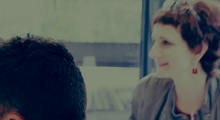
Meet Catherine, a Kedger living in Singapore for 15 years!
Two "KEDGE Alumni Travel" Pro-act students are currently in Singapore, where they have gone to meet alumni living abroad.
INTERVIEW:
To start, please give us a quick introduction.
Hello. My name is Catherine Peyrols Wu, I was part of the 2004 graduating class, and I’m now a Professor of Management at the Nanyang Technological University at Nanyang Business School in Singapore.
What does your job entail? What are your duties?
The job of a university professor is to create and disseminate knowledge so it can benefit the greatest number of people. My work is divided into three major groups of activities.
First, teaching. That’s what makes up the largest part of my time. Since 2012, I’ve taught a course on cultural work intelligence to students at Nanyang Business School. The goal is to shape future managers to work in multicultural teams and in culturally-varied professional environments - which is the case when you move abroad or are employed by a multinational company.
Then, research. Research in management and social sciences involves studying work behaviours. As my field is in intercultural relationships, I am particularly interested in understanding why certain individuals adapt better than others in multi-cultural work environments.
Since 2009, I’ve been part of a team at the University of Nanyang’s research centre in leadership and cultural intelligence (Centre for Leadership and Cultural Intelligence). That is where I did my doctorate in the field. I studied how the presence (or absence) of cultural intelligence and competence in English, a foreign language, influences the participation of individuals in a work team. I’m currently working on a new project in which we are studying the skills needed to train professional networks that are culturally diversified.
Our results are generally presented at international conferences and are published in academic and professional journals after having been subjected to a very rigorous evaluation and examination process.
Finally, service. This covers all support activities that lets the university function, such as student recruitment interviews, or monitoring internships. It also covers supporting activities in the academic community as much as possible, for example, sitting on a panel of judges for research awards, or critiquing a conference or an academic journal.
Tell us about your time at KEDGE? What did you study?
I began attending KEDGE in September 2001. After a year of general studies, I chose to specialise in human resources management. During my second year, I did an Erasmus exchange at Aston University in the UK. I then returned to Marseille to do a two-and-a-half-month internship in the personnel department at the Auchan supermarket, followed by my final year which I completed with an eight-month internship in the HR department at Genoyer, an international company that provides equipment for the petrochemical industry.

How did KEDGE help you develop and reach your goals?
I always knew I wanted to have an international career, which is the reason why I chose to take business courses without knowing too much what one did in them. First of all, KEDGE allowed me to test out my motivations for my plans. During my first year, I had the chance to be part of the team at Interact which at the time was a body of AIESEC. In that association, I got to meet students from around the world, which reinforced my desire to move abroad.
Next, KEDGE allowed me to develop basic skills, such as practicing my English, which was absolutely necessary to carry out my plans. In order to do that, I decided to do a full year abroad. It wasn’t obligatory, but it seemed necessary to me in order to learn how to speak correctly.
Finally, KEDGE allowed me to be in contact with the people who opened the door to my first experience living abroad. In particular, I’m thinking of Bob Aubrey, the professor who taught personal and career development for several years at KEDGE. I didn’t have the chance to take his class, but meeting him allowed me to leave for China, which put me on the path for a career in human development.
How long have you been an expatriate?
I was in Beijing, China, from January 2005 to June 2009, and I’ve lived in Singapore for since July 2009, so ten years.
What were your reasons for moving to Singapore?
I wanted to get a doctorate in the field of cultural intelligence. The first research centre in cultural intelligence was established by Professor Ang Soon at Nanyang Technological University.
What surprised you most about this country?
The intensity in which everything is done. In Singapore, everything goes fast. In other words, it’s efficient on one side but demanding on the other. It’s a country where everything functions well, but sometimes I have trouble following it.
What are your future plans?
For the time being I plan to stay in Singapore. I like the dynamism and opportunities that large cities offer.
Is there another country in which you would have liked to live and why?
Sometimes, I dream about finding the enthusiasm that I saw in Beijing in the years that preceded the 2008 Olympic games - country where strong growth provided numerous opportunities if one was young and motivated. Bangkok, Manila, Jakarta, Ho Chi Minh, and Rangoon are cities I’d like to live if a chance presents itself.
What advice would you give to a student or recent graduate who might consider trying such an adventure?
First of all, I’d advise getting good health insurance. Problems can happen suddenly and can be very expensive. It's very hard to be physically sick when you're away from family and friends.
Next, choose a developing country where the cost of living is relatively low. This gives you more flexibility when looking for a job, as well as the chance to explore various opportunities.
Finally, once there, meet as many people as possible. If possible, join an association to make local contacts. Don’t hesitate to offer your services on several tasks in order to get to know them.

Interview conducted in Singapore by Emma and Manon, KEDGE Alumni Travel Pro-Act students.
FIND OUT MORE ABOUT THE KAT PROJECT
FOLLOW THEIR ADVENTURES ON FACEBOOK



0 Comment
You must be logged in to leave a comment.
No comment